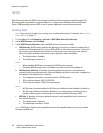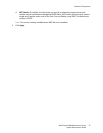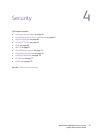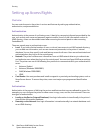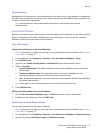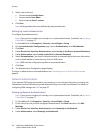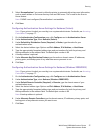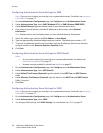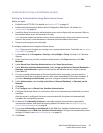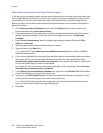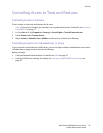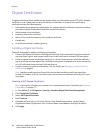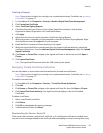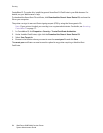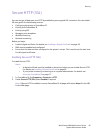Security
WorkCentre 6400 Multifunction Printer
System Administrator Guide
58
Configuring Authentication Server Settings for SMB
Note: If your printer is locked, you must log in as a system administrator. For details, see Accessing
CentreWare IS on page 17.
1. On the Authentication Configuration page, click Configure next to Authentication Server.
2. Under Authentication Type, select SMB (Windows NT 4) or SMB (Windows 2000/2003).
3. Under Default Domain, type the domain name of your authentication server.
4. If you want to specify domain controller IP addresses or host names, select Optional
Information.
Note: Address options do not display unless you have selected Optional Information.
5. Select the address type. Options are IPv4 Address, or Host Name.
6. Type the appropriately formatted address and port number. The default port number is 137.
7. To specify any alternate domains and controllers, type the IP addresses, host names, domains,
and port numbers in the Alternate Domains (Optional) fields.
8. Click Save.
Configuring Authentication Server Settings for NDS (Novell)
Notes:
• If your printer is locked, you must log in as a system administrator. For details, see
Accessing CentreWare IS on page 17.
• Netware must be enabled. For details, see NetWare on page 47.
1. On the Authentication Configuration page, click Configure next to Authentication Server.
2. Under Authentication Type, select NDS (Novell).
3. Under Default Tree/Context (Required), type the details in the NDS Tree and NDS Context
fields.
4. Under Alternate Tree/Context (Optional), type the details in the NDS Tree and NDS Context
fields, if required.
5. Click Save.
Configuring Authentication Server Settings for LDAP
Note: If your printer is locked, you must log in as a system administrator. For details, see Accessing
CentreWare IS on page 17.
1. On the Authentication Configuration page, click Configure next to Authentication Server.
2. Under Authentication Type, select LDAP.
3. To configure LDAP settings, click LDAP Settings. For more details, see LDAP on page 37.



